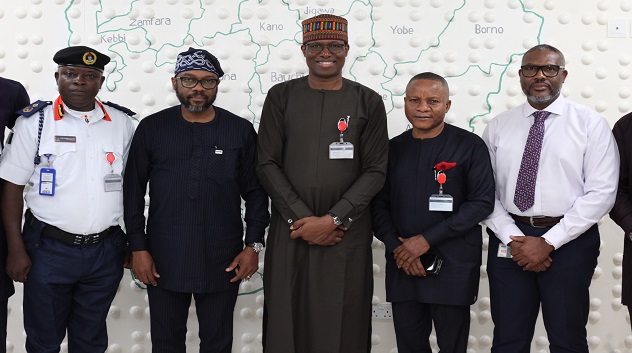Telecom
FG Moves to Stem $2.16Bn Annual Capital Flight in Telcoms Sector

As much as $2.16billion leaves the Nigeria’s telecommunications sector annually as capital flight and the federal government is worried about it, according to Isa Pantami, minister of Communications and Digital Economy.

Dr Isa Ali Ibrahim Pantami, minister of Communications and Digital Economy.
Pantami, quoting a report of the Association of Telecommunication Companies of Nigeria (ATCON) at the Digital Nigeria Day, stated that to stem the trend of capital flight, the government had developed a policy to promote indigenous content.
The minister said the Indigenous Content Development and Adoption, under Pillar #8 of the National Digital Economy Policy and Strategy (2020 – 2030), would tackle the issue.
The Digital Nigeria Day was marked on Saturday in Abuja by the communications ministry, its agencies and other stakeholders in the sector.
Pantami said, “As part of our efforts to promote indigenous content, we have developed a policy for promoting indigenous content in the telecom sector to complement similar efforts that focus on the information technology sector.
“This is important to stem the tide of capital flight, among other things. A report of the Association of Telecommunication Companies of Nigeria suggests that such capital flight in the telecom sector is as high as $2.16bn annually.
“A healthy digital economy requires a robust indigenous content policy to significantly reduce this.”
The minister explained that there was an urgent need to promote the development of indigenous content in every sector of the economy.
He said the Indigenous Content Development and Adoption pillar was addressing this for the digital economy.
“This pillar aligns with Executive Orders 003 of May 2017 and 005 of February 2018, on ‘Support for Local Content Procurements by Ministries, Department and Agencies of the Federal Government of Nigeria,” he said.
Pantami said it aligned with the order on Planning and Execution of Projects, Promotion of Nigerian Content in Contracts and Science, Engineering and Technology.
The minister also noted that the solid infrastructure arm of the digital economy policy would address the need to provide broadband access and data centres required to enable citizens to access the digital solutions.
He said the Nigerian National Broadband Plan (2020-2025) was developed to accelerate the growth of broadband connectivity across the country.
Pantami said, “The plan is designed to deliver data download speeds across Nigeria of a minimum 25Mbps in urban areas, and 10Mbps in rural areas, with effective coverage available to at least 90 per cent of the population by 2025.
“This will be at a price not more than N390 per 1GB of data (two per cent of median income or one per cent of minimum wage).”
He said the government also approved the designation and protection of relevant telecommunications infrastructure across the country as critical national infrastructure.
Telecom
IHS Nigeria Hosts Telecom Industry Stakeholders to Discuss Protection of Critical National Infrastructure in Lagos State

IHS Nigeria, part of the IHS Holding Limited (NYSE: IHS) (“IHS Towers”) group, one of the largest independent owners, operators, and developers of shared communications infrastructure in the world by tower count, recently hosted a high-level meeting of stakeholders in the telecommunications industry including regulators and law enforcement agencies, at its corporate headquarters in Lagos.

The meeting was organized to develop a multi-stakeholder action plan for the protection of Critical National Information Infrastructure (CNII) assets in Lagos state.
Recognizing the importance of communications infrastructure as the backbone of national security, economic growth and social cohesion, the stakeholders at the meeting convened under the umbrella of the Association of Licensed Telecoms Operators of Nigeria (ALTON) agreed on the urgent need for collaborative solutions to ensure the protection of these vital assets.
The meeting was attended by senior representatives from the telecommunications stakeholder groups and regulatory bodies including the Nigerian Communications Commission (NCC), the Association of Licensed Telecoms Operators of Nigeria (ALTON), Association of Telecommunications Companies of Nigeria (ATCON) and the Lagos State Infrastructure Maintenance and Regulatory Agency (LASIMRA).
Also in attendance were representatives from the Mobile Network Operators (MNOs), and InfraCos as well as the Nigeria Security and Civil Defence Corps (NSCDC), the security agency tasked with the protection of Critical National Infrastructure across the country.
Following extensive deliberations, the stakeholders resolved to establish a working group dedicated to addressing key industry challenges, including the vandalization and theft of telecommunications infrastructure, arbitrary shutdown of base stations, fiber cuts due to road construction and the denial of access by unauthorized individuals by leveraging technology for real-time monitoring and protection, strengthening security measures around telecommunication sites and collaborating more with the security and regulatory agencies to mitigate these challenges.
The stakeholders underscored the need to prioritize deterrence and prevention of these incidents and highlighted the importance of public awareness campaigns to sensitize the host communities and public of the need to protect telecommunications infrastructure in their localities.
Dapo Otunla, Senior Vice President & Chief Corporate Services Officer of IHS Nigeria, commented, “The protection of Critical National Information Infrastructure (CNII) has been a critical concern for all industry stakeholders.
“We are experiencing daily losses of assets, which significantly impact on the quality of service delivered to subscribers. Addressing these issues is paramount to sustaining Nigeria’s digital ecosystem and meeting regulatory expectations.”
Telecom
MTN Champs Continental Relays: Over 1,000 Athletes Gear Up for Lagos Showcase

Over 1ooo athletes are already set to participate in the upcoming MTN Champs Continental Relays, taking place between April 9 and April 12 at the UNILAG and Yabatech Sports complexes. Organisers anticipate even more registrations before the April 2 deadline.

MTN Champs is Nigeria’s largest grassroots sports competition, a collaboration between MTN Nigeria and Making of Champs (MoC), providing a platform for young athletes to showcase their talents and potentially represent Nigeria on the global stage.
Osaze Ebueku, Senior Manager, Go-to-Market at MTN Nigeria at the opening ceremony of the MTN Champs Classics events in Benin had emphasised the long-term vision behind MTN Champs: “We’re building future Olympians for Nigeria. MTN Champs is about more than competition. It’s about changing lives.”
The continental relays mark the second leg of the MTN Champs Season 3, following the Classics competition in Benin, which saw 4,371 event entries from 2,056 athletes.
As of March 24, the Lagos leg had already recorded 2,821 event entries across different age categories, highlighting the growing enthusiasm around the competition.
The registered athletes are spread across four categories, with 174 in the Cadet (U-14) category, 388 in Youth (U-17), 270 in Junior (U-20), and 279 in the Senior category.
To ensure smooth participation, organisers have outlined important guidelines. Athletes in the Cadet, Youth, and Junior categories must submit a signed Parental Consent Form, while all registered schools and athletes must collect their competition bibs by April 8 at the competition venue to confirm their participation and secure their place on the start list.
Sports enthusiasts can look forward to an electrifying showcase of emerging talent, as young athletes seize the opportunity to prove their skills on a professional stage.
Telecom
Again, Labour Fumes, Threatens Shutdown of Telcos over Non-Implementation of 15 Percent Tariff Reduction

Nigeria Labour Congress (NLC) is threatening to shut down operations of telecommunications companies over their refusal to comment on the 15 percent reduction in telecom tariffs.

Recall that that organised labour, through the NLC, forced the federal government and NCC to reduce the telecommunications tariff hike from 50% to 35% after threatening to shut down telecom operations and the NCC in response to what it saw as exploitative economic policies amidst excruciating suffering, hardship, and deepening poverty.
The government had previously formed a 10-member committee, consisting of five government and NLC representatives, to deliberate on the thorny topic of tariff hikes within two weeks and report back before making a final decision on the new telecom tariff structure.
Consequently, on Friday, February 21, 2025, the committee, at a meeting conducted in the office of the National Security Adviser (NSA) that lasted nearly three hours, decided on a 15 per cent tariff cut.
According to reports, in accordance with the conditions of the agreement, an official communiqué announcing the tariff reduction was scheduled to be released on Saturday, February 22.
According to Chronicle,iIt was said that the meeting began at 4:00 p.m. and concluded around 7:00 p.m., during which NLC representatives insisted that the tariff hike be withdrawn.
According to sources, after significant pressure from NLC representatives in the 10-man committee, the government and NCC gave up and agreed on the 15% decrease, which the government or NCC should have announced the next day.
However, at the time of this report, no such announcement has been made.
Leaders of the labour union are not taking the government’s failure to announce or implement the 15% tariff decrease lightly, suspecting that they have been duped.
The Labour leaders have therefore resolved to directly confront the NCC and telecommunications operators next week.
Though it has been reported that the date for the start of the industrial action against the NCC and telecom providers has been set and mobilisation is underway, the information is being closely guarded.
One of the leaders of the NLC stated that “We have received directives to commence mobilisation since last week. In fact, the date for the commencement of industrial action against the NCC and telecommunication operators’ offices across the country has been fixed. We have been warned not to disclose the date because the plan is to take all concerned by surprise. We are not giving any notice because we thought we had resolved this matter over a month ago. It is as if we have been scammed. Therefore, we have decided to confront the matter head-on.”
On February 12, the NLC expressed outrage over telecommunications companies’ tariff hikes, despite an earlier agreement with the Federal Government and the NCC.
According to the Labour union, “If the telecommunications companies fail to revert to the old tariff by the end of February 2025, a total shutdown of their operations nationwide will commence on March 1, 2025.”
To demonstrate its seriousness, the NLC declared that, as a first step in resisting the arbitrary tariff hike, it directed that workers and other willing citizens boycott the services of MTN, AIRTEL, and GLO daily between 11:00 a.m. and 2:00 p.m. until the end.
On Tuesday, February 11, NLC leaders issued a communiqué at the conclusion of their Central Working Committee (CWC) meeting in Lokoja, Kogi State, urging workers and citizens to suspend data purchases from telecommunications companies, which have also become one of their most effective tools for exploiting Nigerian citizens.
The communiqué, signed by Joe Ajaero and Emma Ugboaja, Congress’ President and General Secretary, respectively, instructed NLC State Councils and industrial union affiliates to quickly sensitise and mobilise their members and the general public in their jurisdictions.

 Telecom3 days ago
Telecom3 days agoAgain, Labour Fumes, Threatens Shutdown of Telcos over Non-Implementation of 15 Percent Tariff Reduction

 News3 days ago
News3 days agoNNPC Ready to Go to Capital Market for IPO- CFIO

 E-Business3 days ago
E-Business3 days agoFG Launches Online Visa Approval Centre

 E-Business3 days ago
E-Business3 days agoQNET Disassociates From Fraudulent Academy in Abuja, Supports EFCC Arrest

 Telecom2 days ago
Telecom2 days agoIHS Nigeria Hosts Telecom Industry Stakeholders to Discuss Protection of Critical National Infrastructure in Lagos State

 E-Financial2 days ago
E-Financial2 days agoTitan Trust Bank Selects Oracle FSS for Core and Digital Banking Technology

 General News2 days ago
General News2 days agoNCS to Launch Electronic System for Cash Declarations at Airports

 News2 days ago
News2 days agoSanwo-Olu Hails Jumia for Giant Strides in Growing Nigeria’s E-Commerce Sector




















